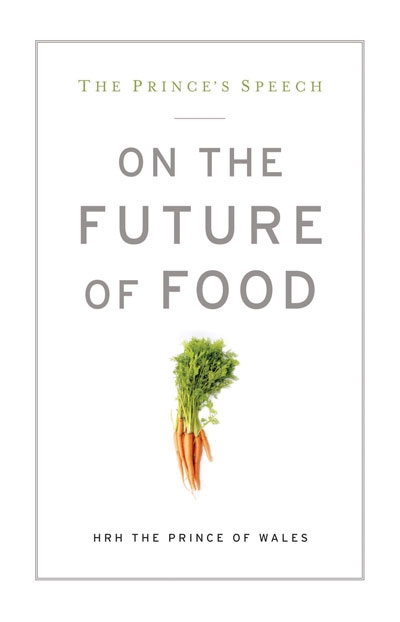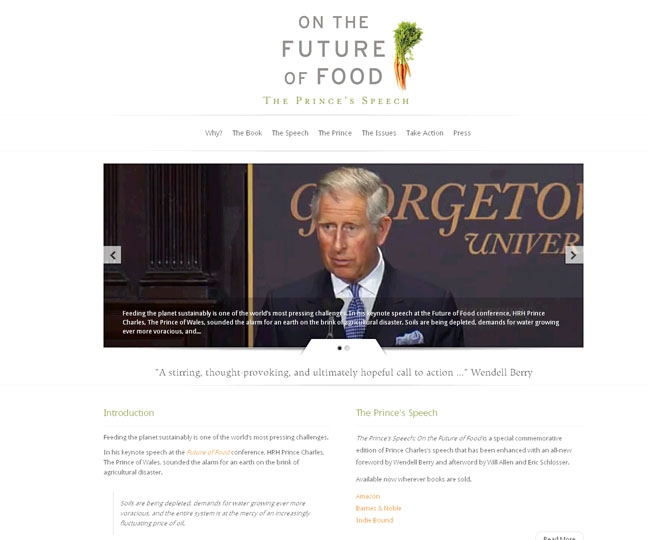
The pamphlet or tract format of this publication was intriguing to me; I immediately thought of Thomas Paine’s Common Sense. It evoked a sense of the historical use of pamphlets in America as a means to influence political life. Its compact size and compelling message invite the reader to pass it on. (I did find it all a little dizzying in a historical sense to think of the food aspect of the relationship between America and Great Britain over the centuries: America first as a British colony with a role in providing agricultural and natural resource products to the mother ship; then America as a new nation created by a revolution of farmers – okay, farmers AND others; America providing much needed sustenance to England during World War I; and in 2011, a modern American audience hearing an important message about sustainability in food systems from a member of the British royal family. Admittedly, though, there is an enormous difference between King George III and Prince Charles).
The food system today is a highly political issue. Nearly everyone I know agrees that the future of food will require a complex and inter-related set of choices and actions, each with economic, cultural and geopolitical implications. Nearly everyone I know agrees that many of our current practices are not sustainable when considered within any number of frames (water quantity and quality, pollution, soil erosion, climate change, social justice, etc). We can no longer afford to view pieces of the food system in isolation (whether by commodity or a single geographic location). Rather, we must view the system as a whole, because the “solution” to a production problem in a certain commodity or place may create problems in other areas. Acting in concert may save us; continuing to consider food production in an isolated fashion will certainly doom some of us.

In 2008, a report called the “International Assessment of Agricultural Knowledge, Science and Technology for Development” was published. Representing collaboration among a number of groups, including the United Nations, the report concluded (among other things) that small-scale farming systems utilizing agro-ecological approaches were found to be among the most productive in what the report classified as developing nations. This finding could have implications for how the challenge of food insecurity is approached. A full copy of the report can be found at www.agassessment.org; it provides an interesting and somewhat sobering view of the state of agriculture and food systems around the world.
In general, “On the Future of Food” lays out most of what more and more people are coming to believe about the food system. It does so succinctly, summarizing a wide range of issues briefly (yet thoroughly). It provides a systems view. What is novel in the piece are Prince Charles’ statements about the true costs of food production, which he argues are not factored into the bottom line. His point? Everyone pays a higher price than the “market price,” whether it be through the costs of mitigating pollution, increased public health costs due to higher obesity rates, etc. Of no small consideration are what Prince Charles terms the “true costs to the Earth” of certain production practices. (He deems low food prices in some nations “an illusion”). He also briefly discusses a study, sponsored in part by the United Nations, entitled “The Economics of Ecosystems and Biodiversity” (TEEB), which explores the concept of natural capital. The purpose of this study in part was to “initiate the process of analyzing the global economic benefit of biological diversity, the costs of the loss of biodiversity and the failure to take protective measures versus the costs of effective conservation.” The full report can be found at www.teebweb.org.
Some have dismissed the prince’s work on sustainability issues as the dabbling of a rich royal who is removed from the concerns of real life. However, through his foundation, the prince has been engaged in the issue of sustainable communities for a quarter of a century. He has long been engaged in developing sustainable practices on the properties he owns. Since 2004, Prince Charles has also worked on an “Accounting for Sustainability Project” that provides tools for various businesses and other groups to help achieve the changes needed in corporate reporting, accounting and decision-making that will take into account natural capital (the kinds of changes he deems necessary in the food system for it to achieve true sustainability).
The Prince of Wales shares how he is inspired by recent initiatives in the United States (he even mentions Wal-Mart’s local/organic sourcing). Perhaps the most emotional and emphatic arguments for change in this pamphlet come in the foreword and afterword, written by Wendell Berry, Will Allen and Eric Schlosser (the afterword having a particularly populist feel to it).
The prince uses a number of statistics in this pamphlet, and the references page might prove particularly useful to those seeking current information on the topic. This was a good quick read that I’m eager to pass on. The novel size and format attracted the interest of my teen daughter as she passed by; she wanted to know what it was and it sparked a conversation that was worth having…on the future of food.
Author - Emeritus - UCCE Advisor in Digital Communications in Food Systems & Extension Education; Editor, UC Food Observer; Food and Society Policy Fellow